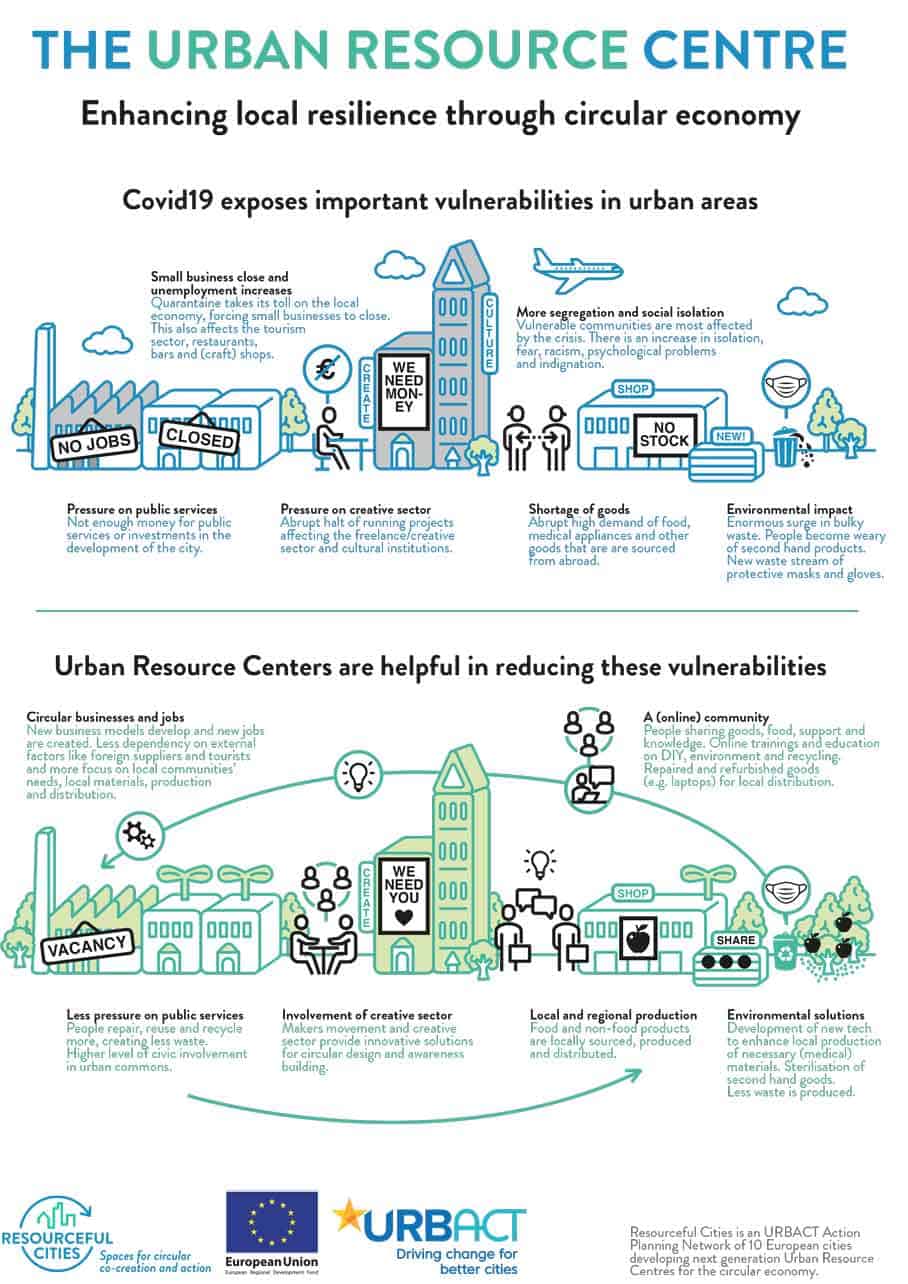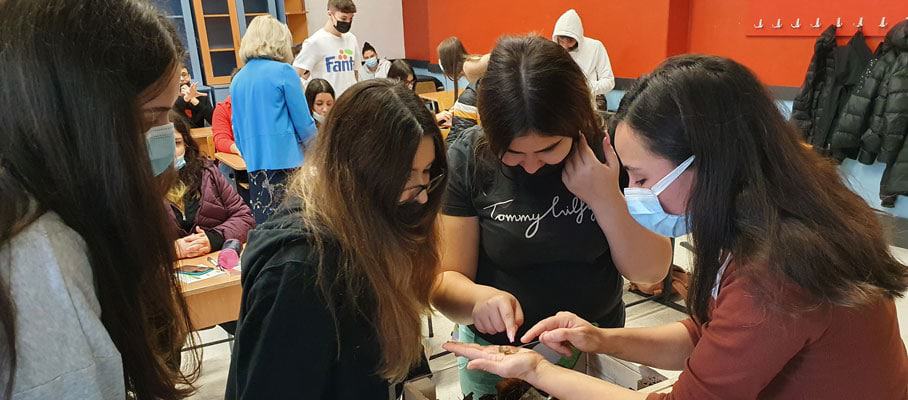For Cities With The Courage To Try, Anything Is Possible: Small-Scale Test Actions Towards A More Circular Economy
Many cities carry out small-scale test actions, seeking to accelerate their transition to a more circular economy. Eileen Crowley reflects on the limitless advantages and opportunities provided to cities that are willing to embrace a culture of experimentation.
“There have been some really exciting changes here in the municipal market. We are finding new uses and value chains for waste streams, inspiring new business models and actively engaging the community in the circular economy. Most exciting of all is that we feel this really is just the beginning.”
These are the words of Ms Ana Silva and Ms Marisa Moreira, project managers at the Urban Sustainability Service in the Municipality of Vila Nova de Famalicão in Portugal. Ana and Marisa are responsible for overseeing a small-scale test action (SSA) seeking to create a zero-waste system at the municipal market. The action was carried out by the city in collaboration with local stakeholders as part of their participation in the URBACT Resourceful Cities action planning network.

A zero-waste cookery demonstration taking place at the municipal market © Câmara Municipal de Vila Nova de Famalicão
Small-Scale Test Actions: The URBACT Resourceful Cities Action Planning Network
“When we started planning this action”, says Anna “we weren’t fully confident that change would be possible, supported, or even welcomed. Trialling some activities in a small way gave everyone the confidence they needed to ‘test the water’, see how things could be done differently and importantly it provided a safety net giving ideas the permission to fail.”
“In short”, says Marisa “it diminished the fear of failure and the fear of the unknown and that proved a very powerful thing for everyone involved”.
The Resourceful Cities network brings together nine diverse European cities that want to develop urban resource centres as a way of accelerating the transition to the circular economy. These centres will serve as connection points for citizens, new businesses, researchers, and the public sector to co-create new ways to close local resource loops while promoting waste prevention, re-use, repair, and recycling.
Recognising the benefits of testing solutions on a small scale before committing to investment on a bigger scale, the URBACT programme introduced the opportunity for partner cities in action planning networks to spend a small amount of their budget on experimenting with new ideas through the concept of SSAs.
All nine cities within the Resourceful Cities network took this opportunity to test their ideas on a small scale and their efforts are proving both enlightening and extremely worthwhile in many aspects.
The SSAs are limited in time, scale, and space and by their nature have the right to fail. The aim is for cities to learn from these tests, measure the results, and either adapt, upscale, or reject actions to be included in the city’s Integrated Action Plan based on this experience.
It is said that fear kills more dreams than failure ever did. Fear is limiting, it limits our imagination and limits our possibilities. At the city level, fear can often result in inaction, a kind of paralysis, often with devastating and wide-ranging social, economic, and environmental consequences. As highlighted by Ana, it is hugely empowering to try out new ideas in a safe space where the courage to try is revered – whatever the outcome.
Recognising the necessity to accelerate the transition from our current take-make-waste system to a more circular economic system, partner cities began their Resourceful Cities journey back in our pre-COVID world of 2019. The consequences of the pandemic served to emphasise the importance of services that could be provided by the Urban Resource Centre.

Using the City as a Laboratory
Today, as we navigate one of the largest humanitarian crises since World War II, we are again reminded of the fragility of our supply chains, the need for resource efficiency, jobs, and social support – all services that can be provided by the urban resource centre. We need solutions, but we need them rapidly. We need to increase the pace of innovation. It’s time to mainstream the concept and use of the city as a laboratory, bringing the efforts and ideas of people across the city (public, private, academia, and individuals) together to find solutions to our most pressing challenges.
In Oslo, the city as a laboratory is not a new concept, an experimental spirit has been embraced there for some time now. As part of their participation in the Resourceful Cities project, the city tested several SSAs, including the trialling of two new employment and training programmes for young people. The programmes, carried out in collaboration with the Norwegian Labour & Welfare Administration (NAV) and the penal care trust, focussed on the production of public furniture and reusable wooden crates from waste picked up at the recycling station. During a six-week trial period, 580 wooden crates were produced, more than 350 kilograms of wood were reused, 25 young people were employed, and the public furniture production team has already been rehired for another important city project.
The trial proved the programmes to be viable, impactful, and well-functioning operational models for youth job creation. The furniture and reusable wooden crates provided a practical means of raising awareness of the value of the circular economy and brought it to life for young people. The resources were local, easily accessible, and the results concrete. Many of the young people reported feeling inspired and some reported that they want to start their own business.
According to Kristine Einbu, a city engineer and project manager for Resourceful Cities in Oslo, ‘the action provided a really inspiring opportunity to see how new models of cooperation even on a small scale can have such wide-ranging impacts, from waste reduction, skills development, job creation, and social inclusion. It showcases in a practical way the opportunities that the circular economy provides and tests like this give the city and its partners confidence to invest and move forward.’ Plans are already underway to replicate and scale up these programmes as part of services delivered by the city‘s urban resource centres.
These are just two of many inspiring examples from cities within the Resourceful Cities network, from Opole and Bucharest to Ciudad Real and The Hague, cities across Europe are embracing the possibilities provided by small scale experimentation, their potential unlimited.

© The Municipality of the 3rd District of Bucharest.
The concept of the city as a laboratory is a powerful one. Unlike the controlled environment provided in a regular laboratory, cities are dynamic and ever-changing. Testing an idea in such an environment, where parameters and conditions are shifting and changing is hugely valuable and enlightening, allowing us to de-risk our ideas and adapt our solutions to that they are agile yet resilient enough to function in challenging circumstances. Trialling and testing provide much-needed stakeholder confidence and motivation and release us from the limitations placed on us by fear. Normalising the culture of testing ideas, learning from the experience, trying out solutions that have been formed from a variety of perspectives without fear of failure sets a city free to evolve without limitations on its potential.
There is so much to learn and so much to gain through the testing process. Now more than ever, we cannot let fear limit our potential. It’s time to look fear in the face and ask ourselves – what could we do if we were not afraid?
